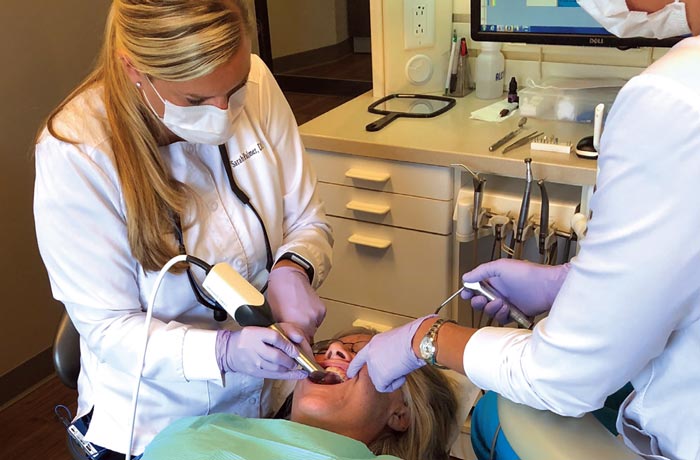An Overview to Usual Dental Conditions That Call for a Dental practitioner's Treatment
Understanding the array of oral conditions that require professional treatment is extremely important for preserving optimum oral health and wellness. Toothaches, for instance, can be symptomatic of extreme issues such as dental caries, broken teeth, or abscesses, each calling for details treatments like dental fillings or origin canals. Periodontal condition, from the onset of gingivitis to more serious periodontitis, underscores the significance of routine dental check-ups and cleansings. Impacted knowledge teeth and jaw problems can present significant pain and issues. Making certain timely brows through to the dental practitioner can reduce these issues properly, however just what are the therapies and signs entailed?
Toothaches
Toothaches are an usual dental problem that can range from moderate pain to severe pain, often suggesting a hidden concern that needs specialist focus. This pain can originate from a range of resources, including dental cavities, fractured or fractured teeth, and dental abscesses. Each of these problems postures significant risks if left unattended, possibly bring about a lot more extreme problems.
Oral tooth cavities, additionally known as cavities, are brought on by the buildup of plaque that deteriorates tooth enamel, resulting in holes or pits in the affected teeth. Broken or fractured teeth, on the various other hand, might arise from injury, grinding, or attacking right into difficult items. These architectural problems can subject the delicate internal layers of the tooth, triggering sharp pain and enhancing the danger of infection. Abscesses are agonizing infections at the origin of a tooth or in between a tooth and the gum, generally resulting from serious decay or neglected cavities.
Efficient treatment of toothaches includes addressing the origin. This may consist of dental fillings for cavities, crowns for cracked teeth, or origin canals and prescription antibiotics for abscesses. Early treatment by a dental specialist can avoid further damage and relieve discomfort, making sure optimal dental health and wellness.
Gum Illness

The primary reason of periodontal disease is bacterial plaque, a sticky, anemic film that regularly develops on teeth. Poor dental hygiene, smoking cigarettes, genetic tendency, and certain clinical conditions, such as diabetes, can worsen the risk of developing gum tissue condition. Routine oral examinations are critical for very early discovery and monitoring of this condition.
Treatment for periodontal illness ranges from professional dental cleansing and scaling to advanced procedures like origin planing and gum surgical treatment, depending on the extent. Keeping good dental health practices, consisting of brushing twice daily, flossing, and making use of an antibacterial mouth wash, can considerably minimize the threat of periodontal illness and promote healthier periodontals.
Tooth Cavities
Tooth cavities, additionally recognized as cavities, are a common dental problem identified by the devastation of tooth enamel due to acid-producing bacteria in the mouth. These microorganisms flourish on sugars and starches from food and drinks, producing acids that slowly erode the enamel, bring about cavity formation.
Early-stage dental caries may disappoint symptoms, but as they proceed, they can create toothache, level of sensitivity to chilly or warm, noticeable holes or pits in the teeth, and discoloration. If left neglected, dental caries can penetrate deeper layers of the tooth, potentially leading to severe discomfort, infection, and also missing teeth.
Preventing tooth cavities entails a combination of great dental health practices and dietary practices. Regular brushing with fluoride toothpaste, flossing, and routine oral check-ups are crucial. Dental experts may likewise advise extra precautionary measures, such as fluoride therapies and oral sealers, to shield teeth from degeneration.
Therapy for cavities depends on their seriousness. Minor cavities can be attended to with dental fillings, which restore the tooth's structure. If the degeneration has actually gotten to the tooth's pulp, a lot more sophisticated instances might call for crowns or also origin canal therapy. Prompt intervention by a dental professional is vital to avoid issues and preserve overall dental health and wellness.
Impacted Knowledge Teeth
Impacted knowledge teeth are a common oral problem that takes place when the 3rd molars, typically described as wisdom teeth, stop working to completely arise or straighten correctly within the mouth. This problem commonly results from not enough space in the jaw or an abnormal development angle of the teeth. Impacted wisdom teeth can bring about a variety of difficulties, including damage, infection, and pain to adjacent teeth.
When knowledge teeth my company end up being influenced, they are commonly partly erupted or remain completely under the gum line. This partial eruption can produce a path for microorganisms to enter the periodontals, bring about infections that manifest as swelling, pain, and also high temperature (dentist in eugene oregon). In addition, influenced wisdom teeth can put in pressure on bordering teeth, possibly creating crowding or shifting
An extensive oral exam, normally entailing X-rays, is essential for identifying influenced knowledge teeth. Therapy usually involves surgical removal, done by a dental specialist. The treatment intends to alleviate discomfort and protect against further complications, such as cysts or damage to surrounding bone frameworks. Post-operative treatment is crucial to ensure appropriate recovery and minimize the risk of infection. Regular oral exams are suggested to monitor the problem and keep dental health.
Jaw Problems
Verdict

Dental dental caries, also recognized as caries, are triggered by the build-up of plaque that erodes tooth enamel, leading to holes or pits in the impacted teeth. Abscesses are unpleasant infections at the origin of a tooth or in between a tooth and the periodontal, typically resulting from severe decay or without treatment dental caries.
Impacted wisdom teeth are a common oral concern that takes place when the third molars, typically referred to as knowledge teeth, fall short to totally arise or align appropriately within the mouth. Impacted wisdom teeth can lead to a variety of problems, consisting of infection, damages, and pain to nearby teeth.
Furthermore, affected knowledge teeth can put in stress on neighboring teeth, possibly causing crowding or moving.